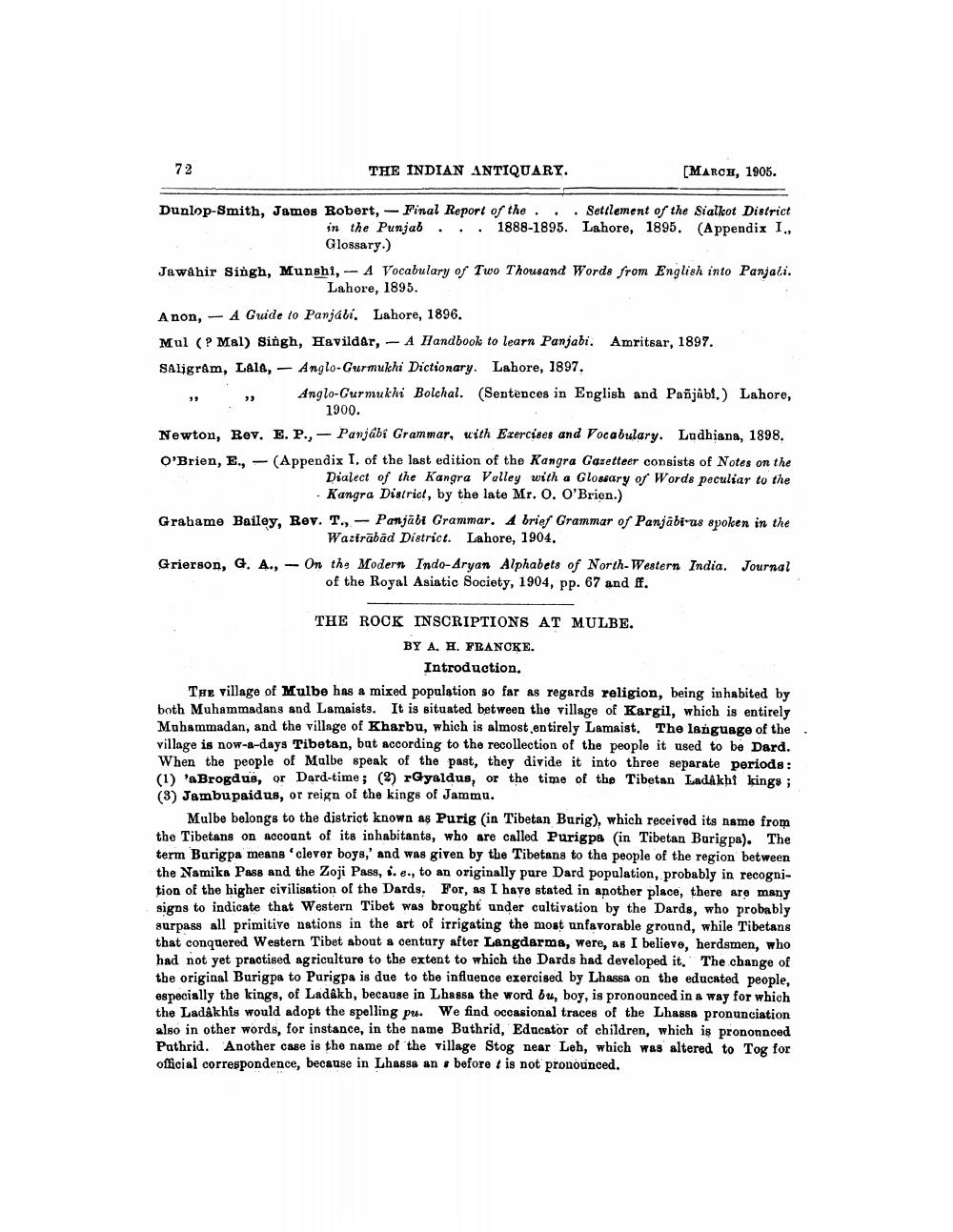________________
72
THE INDIAN ANTIQUARY.
[MARCH, 1905.
Dunlop-Smith, James Robert, - Final Report of the ... Settlement of the Sialkot District
in the Punjab ... 1888-1895. Lahore, 1895. (Appendix I..
Glossary.) Jawahir Singh, Munshi, A Vocabulary of Two Thousand Words from English into Panjali.
Lahore, 1895. Anon, - A Guide to Panjábi. Lahore, 1896. Mul (P Mal) Singh, Havildar, - A Handbook to learn Panjabi. Amritsar, 1897. Saligram, Lala, – Anglo-Gurmukhi Dictionary. Lahore, 1897. , Anglo-Gurmukhi Bolchal. (Sentences in English and Pañjabi.) Lahore,
1900. Newton, Rev. E. P., - Panjabi Grammar, with Exercises and Vocabulary. Ludhiana, 1898. O'Brien, E., - (Appendix I, of the last edition of the Kangra Gazetteer consists of Notes on the
Dialect of the Kangra Valley with a Glossary of Words peculiar to the
• Kangra District, by the late Mr. O. O'Brien.) Grahame Bailey, Rev. T., - Panjabi Grammar. A brief Grammar of Panjabi'us spoken in the
Wazirābād District. Lahore, 1904. Grierson, G. A., - On the Modern Indo-Aryan Alphabets of North-Western India. Journal
of the Royal Asiatic Society, 1904, pp. 67 and ff.
THE ROCK INSCRIPTIONS AT MULBE.
BY A. H. FRANCKE.
Introduction. The village of Mulbe has a mixed population so far as regards religion, being inhabited by both Muhammadans and Lamaists. It is situated between the village of Kargil, which is entirely Muhammadan, and the village of Kharbu, which is almost entirely Lamaist. The language of the. village is now-a-days Tibetan, bat according to the recollection of the people it used to be Dard. When the people of Malbe speak of the past, they divide it into three separate periods : (1) 'Brogdus, or Dard-time; (9) rGyaldus, or the time of the Tibetan Ladakhi kings; (3) Jambu paidus, or reign of the kings of Jammu.
Mulbe belongs to the district known as Purig (in Tibetan Burig), which received its name from the Tibetans on account of its inhabitants, who are called Purigpa (in Tibetan Burigpa). The term Burigpa means 'clever boys,' and was given by the Tibetans to the people of the region between the Namika Pass and the Zoji Pass, i.e., to an originally pure Dard population, probably in recognition of the higher civilisation of the Dards. For, as I have stated in another place, there are many signs to indicate that Western Tibet was brought under cultivation by the Dards, who probably surpass all primitive nations in the art of irrigating the most unfavorable ground, while Tibetans that conquered Western Tibet about a century after Langdarma, were, as I believe, herdsmen, who had not yet practised agriculture to the extent to which the Dards had developed it. The change of the original Burigpa to Purigpa is due to the influence exercised by Lhassa on the educated people, especially the kings, of Ladakh, because in Lhassa the word bu, boy, is pronounced in a way for which the LadAkhis would adopt the spelling pu. We find occasional traces of the Lhassa pronunciation also in other words, for instance, in the name Buthrid, Educator of children, which is prononnced Pathrid. Another case is the name of the village Stog near Leh, which was altered to Tog for official correspondence, because in Lhassa an: before t is not pronounced.




